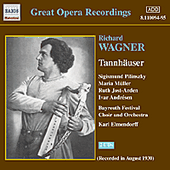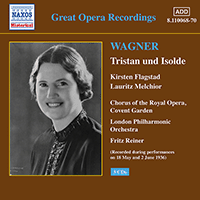
Herbert Janssen
Herbert Janssen was born into a wealthy, music-loving family of Swedish origin and received his first singing lessons when young. Having studied law at Berlin University and served as an officer in World War I, he subsequently studied singing in Berlin with Oscar Daniel. He was immediately accepted by Max von Schillings for the Berlin State Opera, where he made his debut in 1922 as Herod in Schreker’s Der Schatzgräber. Initially he was assigned smaller parts, but gradually his repertoire expanded: he sang Wolfram / Tannhäuser, the role for which he was to become most renowned, during the 1923–1924 season in Berlin. Other roles included the Count / Le nozze di Figaro, di Luna / Il trovatore, Faninal / Der Rosenkavalier, Gérard / Andrea Chénier, Albert / Werther, Valentin / Faust (Gounod), Don Pizarro / Fidelio, Lothario / Mignon, Renato / Un ballo in maschera, Iago / Otello, Don Carlo / Ernani, Escamillo / Carmen and the title role in Rigoletto..
While remaining with the Berlin State Opera until 1937, Janssen soon started to sing elsewhere. From 1925 he took part regularly in the summer Wagner festival at Zoppot: as Wolfram (1925, 1932), Gunther / Götterdämmerung (1927), Amfortas / Parsifal (1928, 1936), Kothner / Die Meistersinger von Nürnberg (1929) and Telramund / Lohengrin (1932). He sang annually in the summer international opera season at the Royal Opera House, London from 1926, undertaking Kurwenal / Tristan und Isolde and Gunther in his first season. He later appeared in important productions of Der fliegende Holländer and Tristan und Isolde at Covent Garden conducted by Reiner and Beecham, also singing Orest / Elektra and in 1935 taking the title role in Borodin’s Prince Igor, for which he was highly praised. During this period he was a guest with the opera companies of Dresden, Munich and Vienna, as well as at Barcelona (1928, 1929), The Hague (1929), the Paris Opera (1931–1934) and La Monnaie, Brussels (1934, 1935).
At the Bayrueth Festival Janssen first appeared in 1930 as Wolfram, with Toscanini conducting. At later festivals he sang Amfortas, Donner / Das Rheingold, Gunther, Kothner and the Herald / Lohengrin. However, having turned down a dinner invitation from Hitler at Bayreuth, Janssen left Germany in 1937 and with Toscanini’s assistance travelled immediately to Buenos Aires. Although he sang with the Vienna State Opera during 1937 and 1938, he then emigrated to the USA, eventually acquiring American citizenship in 1946.
Janssen first appeared in America at the beginning of 1939 in Philadelphia, as the Wanderer / Siegfried with the Metropolitan Opera on tour. He stayed with this company until 1952, predominantly performing his established Wagnerian repertoire. Other occasional roles included Don Fernando / Fidelio, Jochanaan / Salome and The Speaker / Die Zauberflöte. As a result of a shortage of suitable singers, Janssen also took on heavier Wagner parts, to which his voice was less well suited: for example Hans Sachs / Die Meistersinger von Nürnberg and Wotan / Der Ring des Nibelungen.
From 1940 onwards Janssen sang regularly at Buenos Aires and with the San Francisco Opera between 1945 and 1951. Following his retirement in 1952, he taught singing in New York.
Janssen’s performances were notable for the warm and sympathetic timbre of his voice, his excellent command of legato and clear enunciation, as well as his convincing acting. Also a highly accomplished lieder singer, he had in addition starred in the musical Drei Musketiere at the Metropol Theatre in Berlin during 1928 opposite Göta Ljungberg.
© Naxos Rights International Ltd. — David Patmore (A–Z of Singers, Naxos 8.558097-100).
































